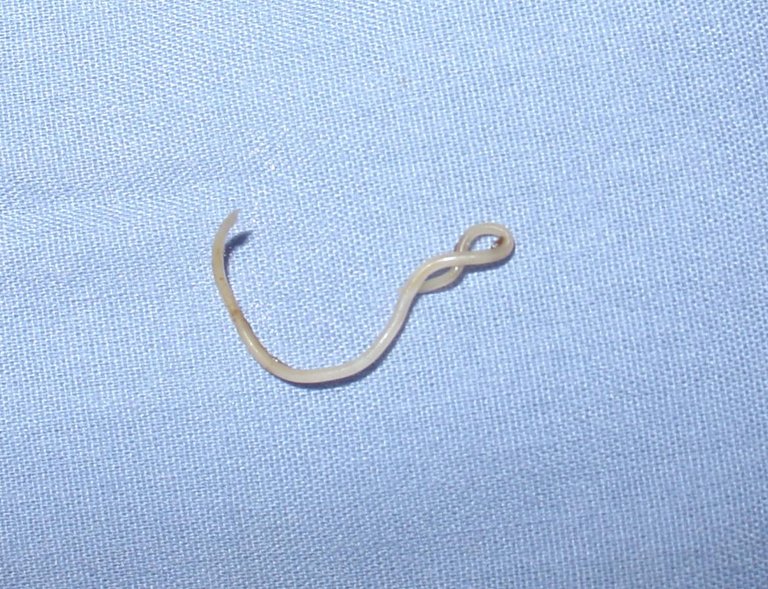Parasites; What Roundworms can do to our Pets
Still looking at the parasites that can affect our pets, we will be studying roundworms today which are also called nematodes or ascarids, they are parasites that freely live in the intestine, existing through the consumption of partially digested intestinal substances. Roundworm happens to be the most common gastrointestinal worm that is found in dogs, it can also be transmitted to humans.

Image credit
Microscopic roundworm eggs are shed through the feces of an affected animal, other pets can get it when they sniff or lick an already infected feces. The eggs of roundworms can also be spread by other animals like, earthworms, cockroaches, rodents, and birds, but in these animals, the roundworms are transported and do not mature into adulthood. If a dog feeds on one of these animals, the roundworm will conveniently continue its life cycle.
The lifecycle of a roundworm in a dog is complicated before it becomes a mature roundworm, it goes through several stages and has to do with migration through different bodily tissues. Immature worms can migrate and become enclosed in a cyst in the tissue of a host's body. When this happens with a female dog, the encysted larvae begin to develop during pregnancy, and ultimately, they will cross the placenta into an unborn puppy.

Image credit
Puppies can be born with roundworms and pass fertile eggs from adult worms in their stool when they are about 11 days old. It is also possible that the roundworm larvae enter into the mother's mammary glands, and get passed through milk to puppies.
It is possible that an infected dog would not show symptoms of infection, but others do, pet owners should watch out for signs like weakness, diarrhea, vomiting, dull coat, malnourishment, stomach pain, and weight loss, roundworm is more noticeable through the feces or vomit of an infected dog, it would have a rice-like appearance, and may even signify the presence of tapeworm.
One of the most common concerns that roundworm brings to puppies is stunted growth. Roundworms particularly feed on digested food in the intestinal tract, depriving the growing puppy of the required vital nutrients especially if available in large numbers. Roundworms will conveniently complete their life cycle in an immature dog, but as the immune system of the puppy gets matured, the larval stage of the roundworm becomes enclosed in a cyst found in the puppy's muscles, they can stay encysted in the tissue of the dog for months or years.
When roundworm larvae are swallowed by adult dogs, it often encysts in the tissues of the dog, with only a little number getting matured into adulthood in the bowel of the dog. As a result of this, only few eggs get passed in the stool resulting in difficulty in diagnosis and treatment.
In a female dog, encysted larvae can resume development after heat, and could proceed to shed eggs in stool at any time. When a dog has been sprayed, roundworm development could be an indication of an underlying immune system disease that has permitted the encysted larvae to complete it's life cycle.
Treatment is quiet easy, there are multiple anthelmintics available for treatment and prevention. The medications targeted for adult worms will be administered within 10-14 days apart and administration would eliminate an existing infection.
As we always say, prevention is better than treatment, so try prevention methods like deworming pregnant dogs six weeks after they have gotten pregnant, this will help to reduce the contamination of the environment for newborn puppies, every dog should be dewormed from time to time. Using heartworm preventive products that are effective against roundworms will stop the shedding of eggs into the environment, rodent control is also highly essential since rodents serve as a strong source of infection.
Humans can get infected too, most likely through the ingesting of eggs that comes from a contaminated soil of dog or cat feces. Children are at a higher chance of having a more serious health problem when they get infected, although rare, but liver problems may come from roundworm larval migration, or the larvae could migrate into the eye and cause blindness.
References.
msdvetmanual.com/digestive-system
vcahospitals.com/know-your-pet/roundworm
news-medical.net/health/Roundworm
Thanks for your contribution to the STEMsocial community. Feel free to join us on discord to get to know the rest of us!
Please consider delegating to the @stemsocial account (85% of the curation rewards are returned).
Thanks for including @stemsocial as a beneficiary of this post and your support for promoting science and education on Hive.